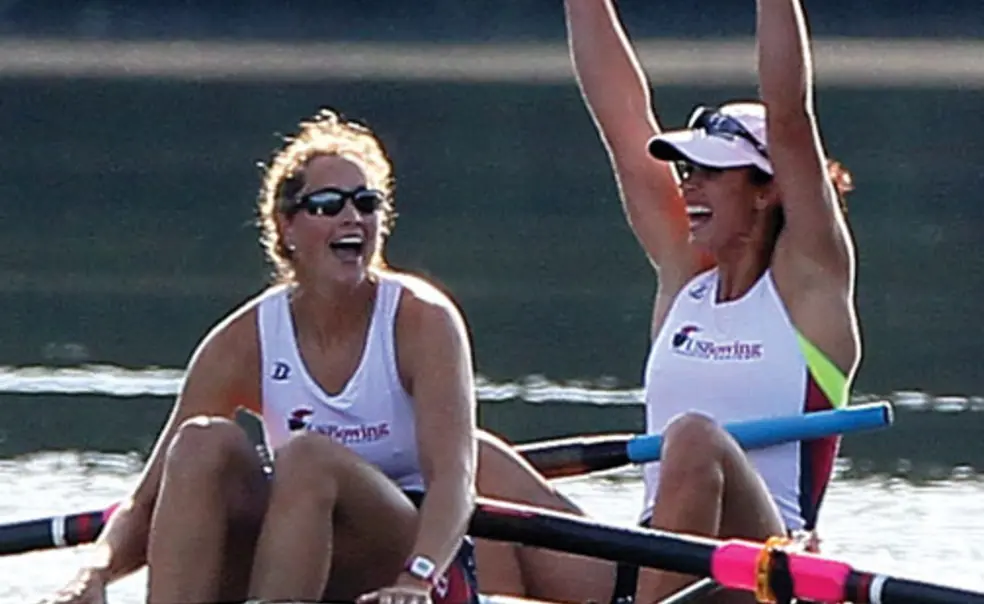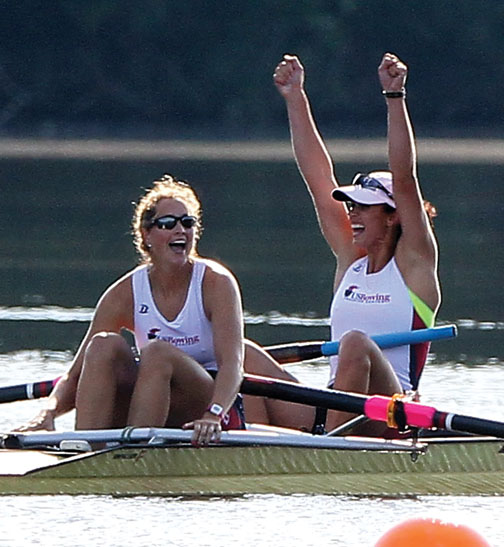Extra Point: Cheering an Olympic hero — and a fourth-place finish
When Sara Hendershot ’10 made the U.S. Olympic rowing team in late June, her hometown of Simsbury, Conn., mobilized.
Her next-door neighbor, Janet Goman, rushed off to Party City, grabbed everything in sight that was red, white, and blue, and enlisted an army of children to run around the neighborhood putting American flags and balloons on mailboxes. Homemade signs sprang up in front yards: Go Sara! Good Luck, Sara!
“They’d never win an award from a sign company,” says Goman. “But they were from the bottom of everybody’s heart.”
The good will was contagious. As Hendershot, who would be representing the United States in women’s pairs with Sarah Zelenka, noted in her blog: “It makes me feel like I will be traveling to London with a real weapon — the hundreds of well wishes from people I care about hiding in my back pocket.”
The 2012 Olympics were the first in which athletes made widespread use of social media to share their experiences. Hendershot wrote detailed blog posts and sent a steady stream of Twitter messages. On July 27: “The Aussie rowing team is having a talent show out in the rowing village courtyard. Love the energy.” On July 29: “These rowing fans are awesome. At 7 a.m., stands were packed and they were starting chants for crews rowing by.”
“It made you feel like you were there,” says Goman.
Hendershot made the finals, and it looked like she had a real shot at a medal. And why not? Princeton rowers were excelling in London: Caroline Lind ’06 won her second straight gold with the U.S. women’s eight, edging a Canadian boat propelled by her Princeton teammate Andreanne Morin ’06 and Lauren Wilkinson ’11. Glenn Ochal ’08 got a bronze with the U.S. men’s four.
But Hendershot missed a medal by one-fifth of a second. Though she and Zelenka were in second place behind Great Britain with 150 meters to go, they fell behind in the final strokes and finished fourth, just two feet shy of third place.
Many consider fourth place the worst possible result — an infinitesimal distance from the bronze, but a world away, too. That was initially how it felt to Hendershot. “Sarah [Zelenka] and I were heartbroken,” she says. “The hardest part was that we were close enough to taste a medal, and then it slipped away.”
But when Hendershot watched a film of the race a few days later, she realized they had rowed a smart, gutsy race. Yes, they probably had used up too much energy from 500 to 1,500 meters, but they had given it their all. Gradually, like someone going through the stages of grief, she came around to feeling proud of their achievement. Sure, it would have been nice to go home with a shiny medal around her neck, but how many people had she and Zelenka beaten to get where they were? As she put it on Twitter: “Quick reflection on our finish. ‘Fourth in the world.’”
Back home in Simsbury, a week after the closing ceremony, the sign at the end of Hendershot’s street was still up. It read: An Olympian lives here. We’re proud of you, Sara.

Merrell Noden ’78 is a former staff writer at Sports Illustrated and a frequent PAW contributor.













No responses yet